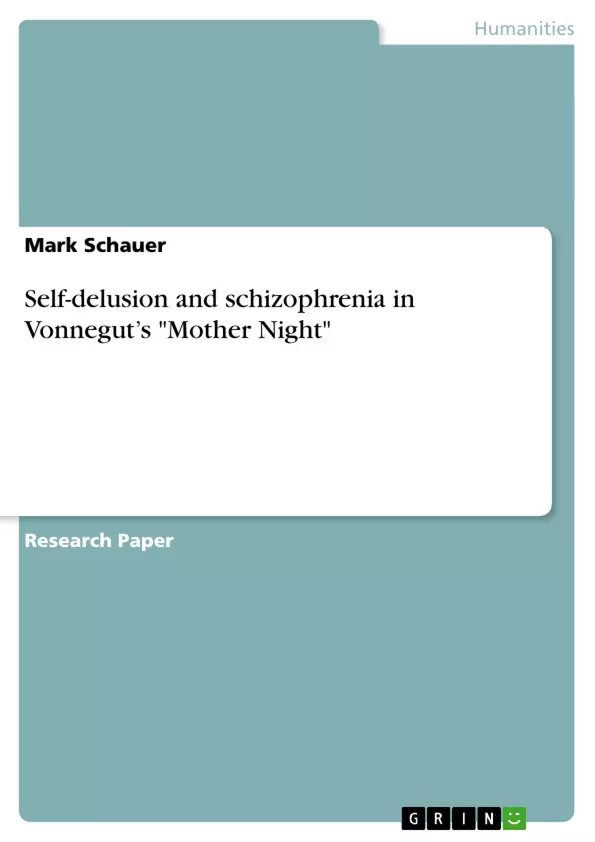Kurt Vonnegut’s Mother Night was one of the two great competing postmodern analyses of the war against totalitarianism. Vonnegut saw World War II as an absurd and tragic consequence of mass schizophrenia in Nazi Germany, and the book’s main character epitomizes and enables this cultural flaw.
Inhaltsverzeichnis (Table of Contents)
- Self-delusion and Schizophrenia
- Campbell's Schizophrenia
- The Nature of Campbell's Schizophrenia
- Campbell's Early Life and Career
- Campbell's Recruitment as a Spy
- Campbell's Capture and Release
- Campbell's Public Exposure and Flight
- The "Helga" Deception
- The "Kraft" Deception
- The "Schildknect" Deception
- The "Kovacs" Deception
- The "Bodovskov" Deception
- O'Hare's Delusions
- Gutman's Delusions
- Epstein's Delusions
- Campbell's Unique Schizophrenia
- Campbell's Escape and Suicide
Zielsetzung und Themenschwerpunkte (Objectives and Key Themes)
This analysis examines the concept of self-delusion and schizophrenia in Kurt Vonnegut's *Mother Night*, particularly as it relates to the main character, Howard W. Campbell. The analysis explores how Campbell's schizophrenia is both a product of his time and a driving force behind his actions. Key themes explored in the text include:- The nature of self-delusion and schizophrenia
- The impact of propaganda and totalitarianism on individual psychology
- The moral complexities of war and wartime decisions
- The role of identity and the construction of self in the face of extreme circumstances
- The power of deception and the difficulty of discerning truth in a world of secrets
Zusammenfassung der Kapitel (Chapter Summaries)
The analysis begins by introducing the concepts of self-delusion and schizophrenia in the context of *Mother Night*. It then delves into the specific characteristics of Campbell's schizophrenia, highlighting the intricate web of contradictions he operates within. The analysis then explores Campbell's early life, focusing on his career as a playwright and his move to Germany with his family. The analysis continues by examining Campbell's recruitment as a spy and his subsequent role in Nazi propaganda. It also explores his capture at the end of the war, his subsequent release, and his eventual exposure and escape in 1961.
The analysis further examines the deceptions surrounding several other characters in the novel, including "Helga," "Kraft," "Schildknect," "Kovacs," and "Bodovskov." It then explores the delusions of O'Hare, Gutman, and Epstein, demonstrating how these characters also grapple with the psychological effects of their experiences. Finally, the analysis concludes by examining Campbell's unique schizophrenia and his eventual suicide.
Schlüsselwörter (Keywords)
This analysis focuses on the keywords: self-delusion, schizophrenia, propaganda, totalitarianism, identity, deception, truth, war, and wartime decisions. These keywords are central to understanding the themes and character development in Vonnegut's *Mother Night*.- Quote paper
- Mark Schauer (Author), 2011, Self-delusion and schizophrenia in Vonnegut’s "Mother Night", Munich, GRIN Verlag, https://www.hausarbeiten.de/document/230272


